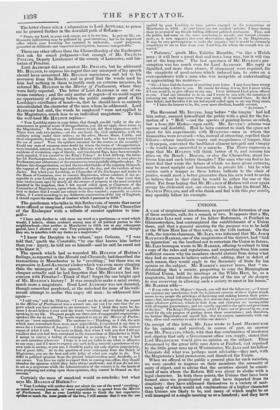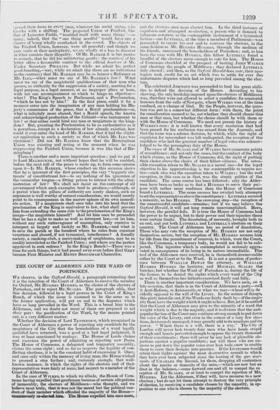UNIONS.
A CASE of magisterial interference, to prevent the formation of one of these societies, calls for a remark or two. It appears that a Mr. RICHARD ILES and some of his fellow Reformers, at Fairford in Gloucestershire, had contemplated the establishment of a Union there, and that a general meeting for the purpose was to be held at the White Hart Inn of that town, on the 15th instant. On the 10th, the interim chairman, Mr. ILEs, was informed that Mr. Jolla RAYMOND BARKER, one of the magistrates of the district, had "laid an injunction" on the landlord not to entertain the Union in future. Mr.ILss hereupon wrote to Mr. BARKER, offering to submit to him a copy of the rules and regulations, and requesting from him some sufficient reason why the members should abstain from doing what they had no reason to believe unlawful; adding, that in defect of such reason, they would apply to the Secretary of State for his opinion on the subject. Mr. BARKER'S answer bears, that "un- derstanding that a society, purporting to copy the Birmingham Political Union, held its meetings at the White Hart, he, as a magistrate, had informed the proprietor of the inn of the danger he was incurring in allowing such a society to meet at his house Mr. BARKER adds- " If you refer to his Majesty's Speech, you will find the following I never can sanction any interference with the legitimate exercise of those rights which secure to my people the privileges of discussing and making known their griev- ances; but, in respecting those rights, it is also my duty to prevent combinations under whatever pretence, which in their form and character are incompatible with all regular governments, and are equally opposed to the spirit and provisions of the law.' The King's Proclamation, which I have not at present by me, was issued for the sole purpose of putting down these associations ; and, therefore, my brother Magistrates and myself feel, that we cannot, consistently with our duty, allow such societies to exist within our district."
On receipt of this letter, Mr. ILES wrote to Lord MELnouaxt for his opinion; and received, in course of post, an answer from Mr. PHILLIPS, which, with that fine combination of insolence and slipslop that only a Government office can supply, stated that Lord MELBOURNE would give no opinion on the subject. Thus threatened by the great little man down at Fairford, and. repulsed by the little great man up at Westminster, Mr. ILEs and his fellow Unionists did what was perhaps most advisable—they met, with the Magistrate's kind permission, and dissolved the Union. When we offered to the public a general plan for such societies, we were careful to impress on their members the necessity of unity of object, and to advise that the societies should be consti- tuted of men whom the Reform Bill was about to clothe with a legal character. In both these points, the Unions that have been formed since we promulgated our plan have departed from its simplicity: they have addressed themselves to a variety of mat- ters, many of which would ask combinations of a higher character than Unions are likely to be, and many of which might be as well managed at a single meeting as at a hundred; and they have opened their doors to every roan, whatever his social status, who knocks with a shilling. The projected Union at Fairford, like that of Leicester Fields, "troubled itself with ma ny things "—so many, indeed, that the "one thing needful" would have run a chance of being wholly overlooked in the crowd. The objects of the Fairford Union, however, were all peaceful; and though we may smile at their multiplicity, we are wholly at a loss to discover in what consists their illegality. Of Mr. BARKER it is but justice to remark, that he did his ministering gently ; the courtesy of his letter offers a favourable contrast to the official hauteur of Mr. Under Secretary PHILLIPS. But while we admit his perfect (rood-breeding,—nay, while we admit (for there are no indications to the contrary) that Mr. BARKER may be as honest a Reformer as Mr. ILEs,—what must we say of Mr. BARKER'S law ? What must we say of the magisterial qualifications of that man who quotes, as authority for the suppression of a society, meeting for a legal purpose, in a legal manner, at no improper place or hour, with not one accompaniment on which to hinge an objection— what ? The King's Speech to Parliament, and a Proclamation, "which he has not by him!" In the first place, could it for a moment enter into the imagination of any man holding his Ma- jesty's commission of the peace, that a Royal proclamation—or, what is infinitely more absurd, that a Royal speech, the known and acknowledged production of the Cabinet—was tantamount to law? or that either could bind any man or magistrate in the king- dom? But, granting the Proclamation to be as authoritative as it is powerless, except as a declaration of law already existing, how could it ever enter the head of Mr. BARKER, that it had the slight- est application to such a society as that of which Mr. ILEs was chairman ? Did not Mr. BARKER know that the Birmingham Union was existing and acting at the moment when he was suppressing the Fairford Union, because it was like that of Bir- mingham ?
There is another and a more important question ; and we put it to Lord MELBOURNE, not without hopes that he will be enabled, before the next roll of the peace is made up, to form some opinion upon it—Is Mr. BARKER, whose conduct on this occasion shows that he is ignorant of the first principles, the very "beggarly ele- ments" of constitutional law—to say nothing of his ignorance of the vernacular tongue—a fitting person to intrust with the admi- nistration of law? We shall not insist on the contempt of all government which such examples tend to produce,—although, at a period when the pillars of authority are sorely shaken, such an argument is well worthy of earnest consideration; we would merely point to its consequences in the narrow sphere of its own immedi- ate action. If a magistrate shall once take into his head that the proclamation of the King is equivalent to law, what shall prevent him from extending the same rule to the proclamation of the King's image—the magistrate himself? And let him once be persuaded that he has a right to make as well as interpret law,—or let him, without any such extravagance of assumption, only contrive to interpret as largely and luckily as Mr. BARKER,—and what is to save the parish or the hundred where he rules from constant vexatious and absurd, if not tyrannical, interference? A friendly society, a smoking-club, a merrymaking of neighbours, may be as readily interdicted as the Fairford Union ; and where are the parties aggrieved to seek redress ? In the King's Bench ?—There was a time for such things, but it had passed away even before Earl GREY became First Minister and HENRY BROUGHAM Chancellor.



























 Previous page
Previous page